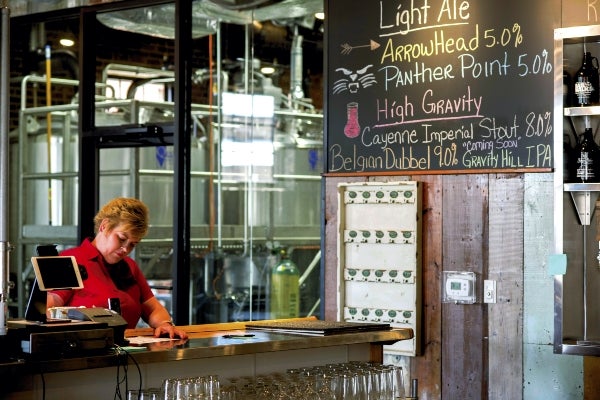David Post: Minding the core
Published 12:00 am Thursday, September 15, 2016

- Front -of-house manager Lauren Viteri looks over the menu hours before the soft opening of the new Morgan Ridge RailWalk Brewery and Eatery recently. Jon C. Lakey/Salisbury Post
By David Post
Councilman Kenny Hardin intelligently asked the city to “show me the money” for economic development. I support his efforts wholeheartedly.
Though he and I voted differently on the downtown incentives, both of us recognized that the economic analysis was lacking. My precise words were, “I don’t buy it.” For both projects.
The Morgan Ridge Brewery analysis indicated that 75 percent of its customers would come from outside the county bringing hotel and other shopping dollars with them. Hogwash. One of my questions was, “How many other Salisbury restaurants bring 75 percent of their customers from outside the county and rent hotel rooms?” No answer. My questions about the Washington Building project also went unanswered.
However, I voted for both incentives. Maybe because I remember when downtown Salisbury had virtually no vacancies and business was so vibrant. Maybe because I was so familiar with the poor condition of the Bernhardt buildings which now house three terrific businesses and six new apartments.
Maybe because I perceive economics as an art, not a science. Economic incentives are not like a candy machine where you put in a dollar and get a candy bar. Economics is less about “causation” than about “correlation.”
A city and its downtown are like an apple: if the core is rotten, the apple probably is too. Is there any city anywhere with a failing downtown enjoying a healthy economy around it?
Other cities provide some insight into what’s worked. The specific quantifiable data that carried the most weight for me was the comparison between Rock Hill and Gastonia. Rock Hill has street-scaped its downtown (an idea I’ve advocated for Salisbury). Its downtown has improved dramatically, and its property tax base per square foot is double that of Gastonia’s.
Charlotte’s downtown with massive investment, new restaurants and businesses and new living spaces is markedly more vibrant with a significantly higher tax base than Greensboro’s. Out-of-business Ivey’s Department Store, once Charlotte’s finest, is now condos. Downtown Charlotte businesses employ thousands from around the entire city, and increased taxes provide the resources to invest in other parts of the city.
Compare Henderson and Hendersonville, two North Carolina cities of similar size. Hendersonville has invested significantly in its downtown. Its median household income is over $10,000 higher, its per capita income is almost $5,000 higher, and its housing values are more than $40,000 higher than Henderson’s. Did its downtown investment cause that? Probably not exclusively, but there is a correlation.
Look at the carnage caused by HB-2. The NBA moved next year’s all-star game out of Charlotte, and the NCAA is moving the men’s regional basketball tournament out of Greensboro. Those economic losses are painful and obvious. That’s clearly causation.
My daughter who lives in San Diego is spending over $1,000 to travel to a Green Bay Packers football game (in December — she’s nuts!). Her San Diego dollars will benefit businesses in Green Bay.
The San Diego Chargers and the St. Louis Rams football teams are both moving to Los Angeles, which spent billions of dollars to incentivize them. San Diego and St. Louis don’t believe it’s worth those same dollars to keep their teams. Ten years from now, the “who is right” incentive question may be answered.
As we know, Salisbury leaks sales tax dollars to other cities and counties. Many who work in Salisbury don’t live here, and people who live and work here spend their paychecks in other counties.
Kenny rightly argues that Salisbury needs more higher-paying jobs. Fibrant was supposed to do that, but “build-it-and-they-will-come” didn’t work. There was no strategy. Economic development usually requires lots of baby steps driven by — and he’s right — data and planning.
In my opinion, Salisbury’s downtown incentives are too rich, but they will accomplish what we want them to do: bring new business to downtown, generate additional sales tax dollars, create more jobs, increase the tax base, and recover the taxpayer’s cost.
As I mentioned to Kenny, I am ready and willing to work with him on economic development and incentives in other parts of the city.
David Post is a member of Salisbury City Council.

